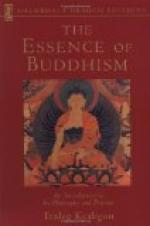He is my husband. I love and revere him with all my heart, and therefore am determined to share his fate. Kill me first, ... and afterwards do to him as you list.—Fo-pen-hing-tsih-king.
A heart bound by affection does not mind imminent peril. Worse than death to such a one is the sorrow which the distress of a friend inflicts.—Jatakamala.
This good man, moved by pity, gives up his life for another, as though it were but a straw.—Nagananda.
Sprinkle water on the seeds of virtue.—Story of Pratiharyya.
The fool thinks himself alone and commits sin. But I know of no lonely place at all.... Of a bad action my “Self” is a witness far more sharp-sighted than any other person.—Jatakamala.
What has been designated “name” and “family” ... is but a term.—Vasettha-sutta.
Reverence ... is due to righteous conduct.—Fo-sho-hing-tsan-king.
The wise man ... regards with reverence all who deserve reverence, without distinction of person.—Ta-chwang-yan-king-lun.
For if virtue flags and folly rules, what reverence can there be ... for a high name or boast of prowess, inherited from former generations?—Fo-sho-hing-tsan-king.
Fools of little understanding have themselves for their greatest enemies, for they do evil deeds which cannot but bear bitter fruit.—Dhammapada.
There is not a spot upon earth, neither in the sky, neither in the sea, neither ... in the mountain-clefts, where an (evil) deed does not bring trouble (to the doer).—Udanavarga.
Surely if living creatures saw the consequence of all their evil deeds, ... with hatred would they turn and leave them, fearing the ruin following.—Fo-sho-hing-tsan-king.
Exercising love towards the infirm.—Fa-kheu-pi-us.
Ever inspired by pity and love to men.—Fo-sho-hing-tsan-king.
He lived for the good of mankind.—Jatakamala.
Whatsoever living beings there are, feeble or strong, small or large, seen or not seen, may all creatures be happy-minded.—Metta-sutta.
Yield not (one moment) to the angry impulse.—Fo-sho-hing-tsan-king.
Overcome anger by love.—Dhammapada.
A wise man never resents with passion the abuse of
the
foolish—Ta-chwang-yan-king-lun.
In agreement with all men, and hurting nobody, ... he, as far as possible, does good to all.—Fo-pen-hing-tsih-king.
Reverently practicing the four gracious
acts—
Benevolence, charity, humanity,
love;
Doing all for the good of men, and
that they in turn may benefit others.
—Phu-yau-king.
They also,[2] resigning the deathless
bliss within their reach,
Worked the welfare of mankind in
various lands.
What man is there who would be remiss
in doing good to mankind?
—Quoted by Max Muller.
[Footnote 2: Buddhist missionaries.]
He identified himself with all beings—Jatakamala.




